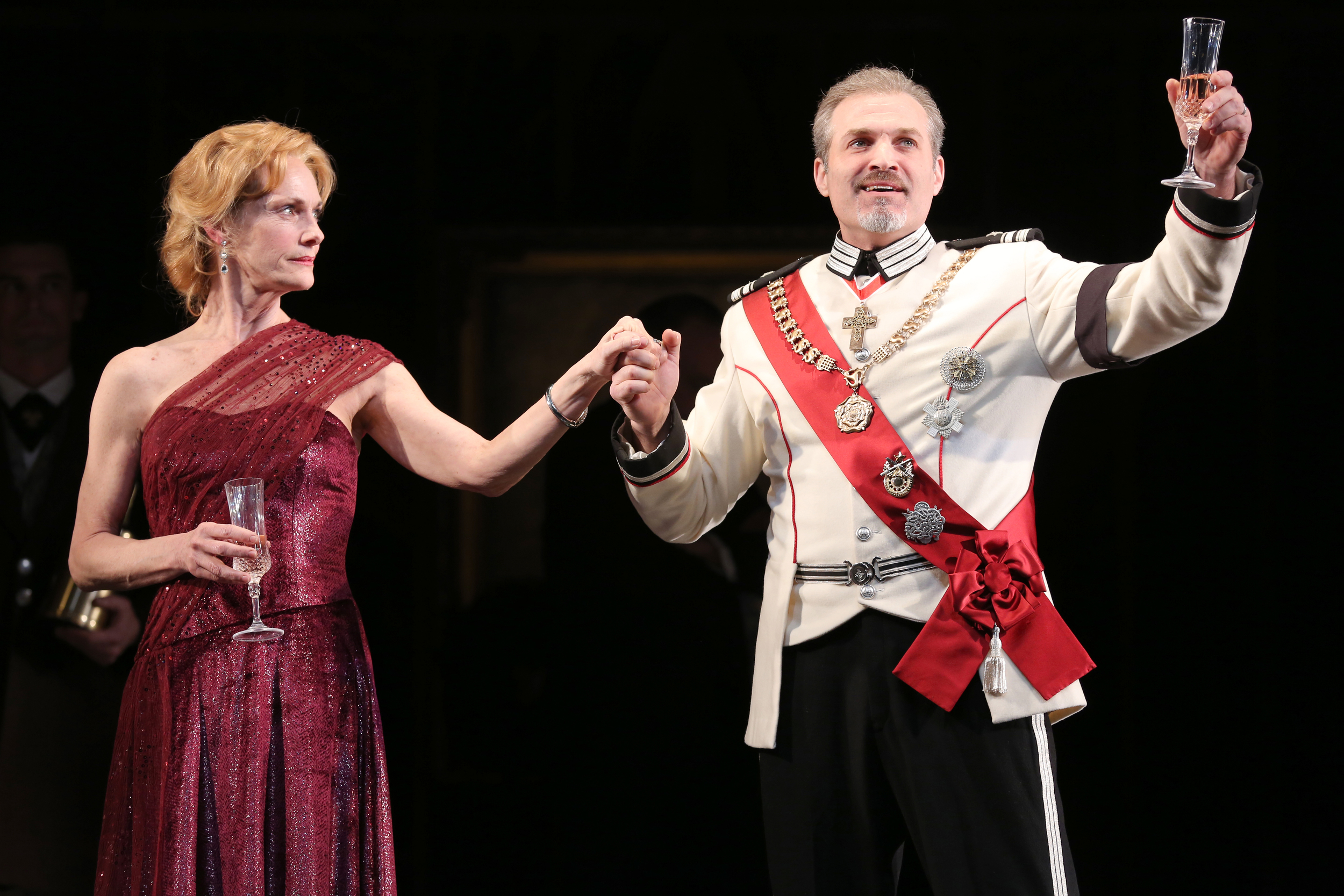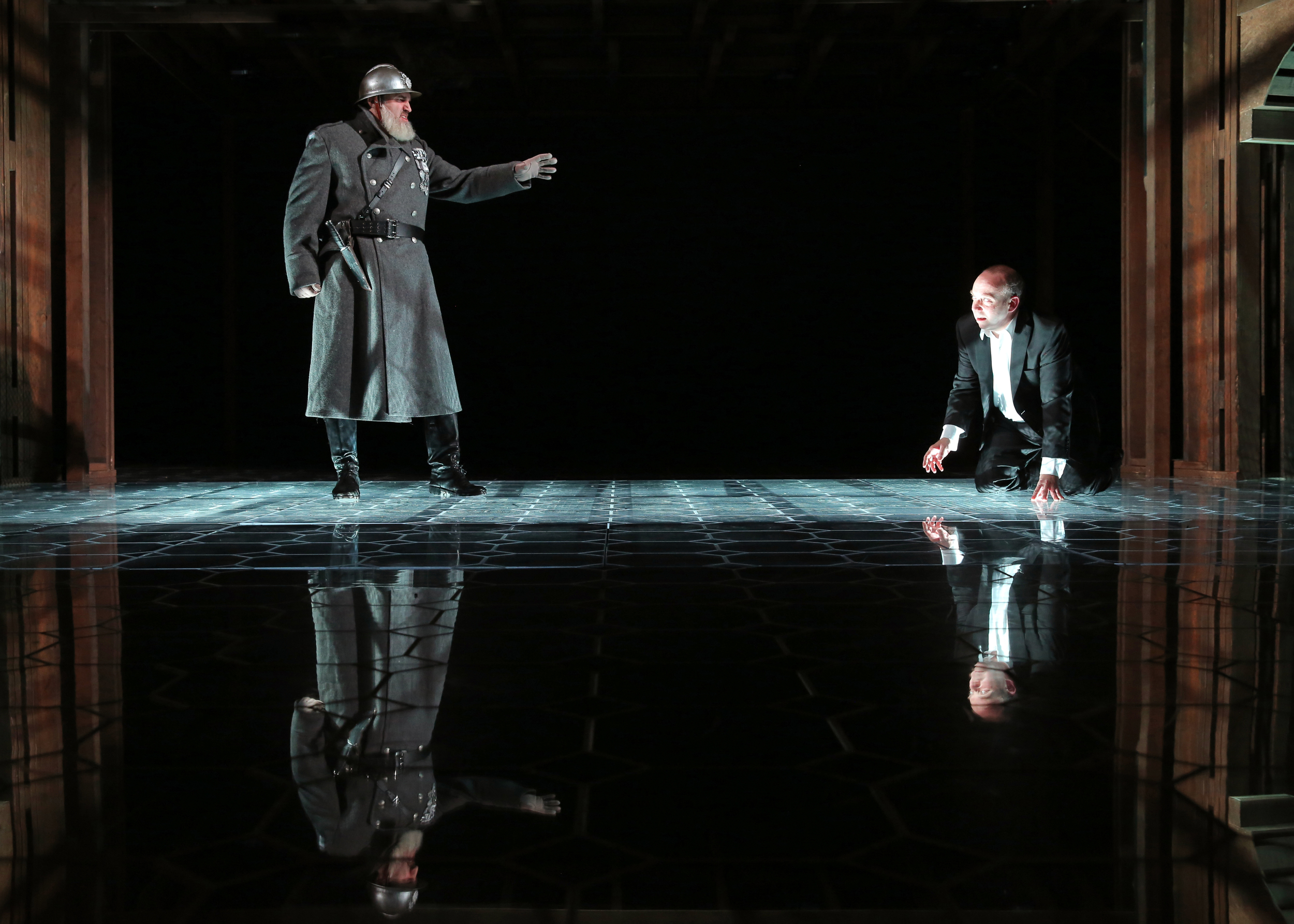Review of Happy Days, Yale Repertory Theatre
In the course of seven years of reviewing plays at the Yale Repertory Theatre, I’ve seen some interesting productions of new plays, but I’ve been waiting for a revival or a staging of a classic play that might be considered definitive and simply not to be missed. Now I have: Samuel Beckett’s Happy Days, directed by the Rep’s Artistic Director James Bundy and starring two-time Academy Award-winning actress Dianne Wiest as the irrepressible Winnie, not only does full justice to Beckett’s most feminine play, it brings to light elements of characterization that couldn’t be more trenchant.
Winnie (Dianne Wiest) (Photo: Joan Marcus)
Most of Beckett’s best-known plays are fairly masculine affairs, as are his most famous narrative works. The typical consciousness in Beckett is not only male, it’s one that primarily sees women as ill-understood maternal functions or via procreative urges to which his characters are sometimes hostile but are mostly indifferent. Happy Days, essentially a monologue by a middle-aged woman sinking into a barren mound, lets us hear the other side of the coin. Do I even have to say why that might be socially and politically relevant in 2016?
We might say that, more than ever, we have to listen to Winnie not simply as a symbol of something, but as a particular quality of mind.
While mostly a monologue, Happy Days is not a soliloquy, and that’s very important. Winnie speaks sometimes to herself and sometimes simply for the benefit of some imagined onlookers, but for the most part she speaks to Willie (Jarlath Conroy), who is not visible to us for most of the show’s two hour running time, but who can be heard sometimes, and seen by Winnie if she turns her head.
That she is able to do in the first half of the show while we see her, from waist up, in a corset, with arms bare. She can rummage in her bag, brush her teeth, consult a mirror, interact with a revolver, don a hat, and, quite memorably, hoist a parasol above her head. When the curtain rises on Act 2, the earth is up to her chin. With nothing to do but talk, she remains cheery if weary, almost but not quite ready to relinquish her consciousness.
Winnie (Dianne Wiest) with paraphernalia (photo: Joan Marcus)
As a discussion question, the meaning of her condition could no doubt float many a literary seminar, but, as a physical state to find someone in, it is, for an audience, profoundly uncomfortable, and therefore humorous so as not to be appalling. In other words: in real life we’d rush to her aid; in theater we simply have to accept it, as does Winnie herself. And, the play suggests, as we will have to, in our own cases, sooner or later. Hamlet tells a skull to remind “my lady” that she’ll become one herself, cosmetics notwithstanding. Beckett makes an entire play of that insight, so that we can’t ignore the baleful significance of the little Winnie retains, nearing the end. Though she can still laugh and hope for something.
In fact, Winnie’s primary effort is to look relentlessly on the bright side. Hence the show’s title, as she finds reasons to consider herself—like Camus would have us imagine Sisyphus—happy. And making of this existential tableau something “lighthearted” takes every bit of Beckett’s incredibly detailed sense of the minutia of human life. Much of Winnie’s talk is trivial, but focused with deliberate endearment on the everyday, with occasional flights of fancy.
Wiest and Bundy have found a tone and a tempo that makes Winnie seem, rather than dotty or in denial, a fully lucid commentator upon her fate. The moods the actress is able to convey with slight facial alterations, with a voice that moves from consoling cooing to spikes of excitement to lamentation and resignation make this a vivid enactment of a vital presence.
It helps considerably that Wiest has a very sensual voice. She can sound sexy when pleased with herself or Willie, gruff when she’s not, and like a musing schoolmarm when trying to remember apropos quotations or appropriate usage, or, at times, like a whimsical child, as when trying to see how much of her own face she can see. She uses dramatized voices to recall a couple who looked upon her plight once and made rude comments. That couple—named Shower or Cooker, Winnie seems to recall—is us: looking on, thinking our thoughts about what she’s wearing or why she’s there or what she means.
Willie (Jarlath Conroy)
Throughout, with his rags on his head, his newspaper, his “straw” (a boater), and, finally, his dress suit (which might be worn equally appropriately to come a-courting or to a graveside), Willie enacts a kind of attenuated autonomy that intrudes itself from time to time on Winnie, if only to increase her sense of immobility. “What a curse—mobility!” she clucks sympathetically at one point.
Essential to the tableau, Willie is a presence of which Winnie is solicitous and which she requires not simply as foil but as the sharer in her sense of her own presence: “Something of this is being heard, I am not merely talking to myself.” There are few plays comparably as deft at suggesting the uncountable days of a long, uninterrupted marriage and the toll such a union takes as well as the enduring sense of identity it confers. If you’re anywhere near middle-age yourself, you’ve probably seen your parents go through it; or you may be, at this point, able to see yourself in the same boat. This play will accelerate that recognition.
Willie (Jarlath Conroy) and Winnie (Dianne Wiest)
The set, by Izmir Ickbal, with its lifelike mound and painted sky befits a diorama into which we peer at a captive for a sign of how life might be conducted under such conditions, while Stephen Strawbridge’s requisite relentless lighting creates a desert atmosphere. The props and costumes, particularly Winnie’s charming little hat and igniting parasol, maintain an air of what Winnie is fond of referring to as “the old style.” There’s a sense that once upon a time life was normal but that it has long since ceased to be so, thus Winnie becomes a figure for the lightness of the mind when faced with the encroaching uselessness of the body. At one point she wonders if gravity might cease to be what it once was and if she could be—like the Madonna herself—“sucked up” into the sky.
Fans of Wiest and admirers of Beckett should not miss this show, even if they’ve seen the play before. I profess myself to be both, and largely because of the sly sense of comedy both author and actress possess. And I’m glad this memorable version of Happy Days represents my first viewing of the play. As Winnie might say, “Oh the happy memories!”
Happy Days
By Samuel Beckett
Directed by James Bundy
Scenic Designer: Izmir Ickbal; Costume Designer: Alexae Visel; Lighting Designer: Stephen Strawbridge; Sound Designer: Kate Marvin; Vocal Coach: Walton Wilson; Movement Coach: Jessica Wolf; Production Dramaturgs: Catherine Sheehy, Nahuel Telleria; Casting Director: Tara Rubin Casting: Laura Schutzel, CSA; Stage Manager: Kelly Montgomery
Cast: Dianne Wiest; Jarlath Conroy
Yale Repertory Theatre
April 29-May 21, 2016








